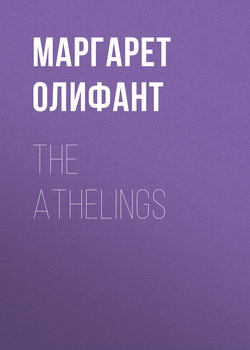Читать книгу The Athelings - Маргарет Олифант - Страница 22
BOOK I.—BELLEVUE
CHAPTER XXI.
A LAW STUDENT
ОглавлениеSteadily and laboriously these early summer days trudged on with Charlie, bringing no romantic visions nor dreams of brilliant fortune to tempt the imagination of the big boy. How his future looked to him no one knew. Charlie’s aspirations—if he had any—dwelt private and secure within his own capacious breast. He was not dazzled by his sudden heirship of the Old Wood Lodge; he was not much disturbed by the growing fame of his sister; those sweet May mornings did not tempt him to the long ramble through the fields, which Agnes and Marian did their best to persuade him to. Charlie was not insensible to the exhilarating morning breeze, the greensward under foot, and the glory of those great thorn-hedges, white with the blossoms of the May—he was by no means a stoic either, as regarded his own ease and leisure, to which inferior considerations this stout youth attached their due importance; but still it remained absolute with Charlie, his own unfailing answer to all temptations—he had “something else to do!”
And his ordinary day’s work was not of a very elevating character; he might have kept to that for years without acquiring much knowledge of his profession; and though he still was resolute to occupy no sham position, and determined that neither mother nor sisters should make sacrifices for him, Charlie felt no hesitation in making a brief and forcible statement to Mr Foggo on the subject. Mr Foggo listened with a pleased and gracious ear. “I’m not going to be a copying-clerk all my life,” said Charlie. He was not much over seventeen; he was not remarkably well educated; he was a poor man’s son, without connection, patronage, or influence. Notwithstanding, the acute old Scotsman looked at Charlie, lifting up the furrows of his brow, and pressing down his formidable upper-lip. The critical old lawyer smiled, but believed him. There was no possibility of questioning that obstinate big boy.
So Mr Foggo (acknowledged to be the most influential of chief clerks, and supposed to be a partner in the firm) made interest on behalf of Charlie, that he might have access, before business hours, to the law library of the house. The firm laughed, and gave permission graciously. The firm joked with its manager upon his credulity: a boy of seventeen coming at seven o’clock to voluntary study—and to take in a Scotsman—old Foggo! The firm grew perfectly jolly over this capital joke. Old Foggo smiled too, grimly, knowing better; and Charlie accordingly began his career.
It was not a very dazzling beginning. At seven o’clock the office was being dusted; in winter, at that hour, the fires were not alight, and extremely cross was the respectable matron who had charge of the same. Charlie stumbled over pails and brushes; dusters descended—unintentionally—upon his devoted head; he was pursued into every corner by his indefatigable enemy, and had to fly before her big broom with his big folio in his arms. But few people have pertinacity enough to maintain a perfectly unprofitable and fruitless warfare. Mrs Laundress, a humble prophetic symbol of that other virago, Fate, gave in to Charlie. He sat triumphant upon his high stool, no longer incommoded by dusters. While the moted sunbeams came dancing in through the dusty office window, throwing stray glances on his thick hair, and on the ponderous page before him, Charlie had a good round with his enemy, and got him down. The big boy plundered the big books with silent satisfaction, arranged his spoil on the secret shelves and pigeon-holes of that big brain of his, all ready and in trim for using; made his own comments on the whole complicated concern, and, with his whole mind bent on what was before him, mastered that, and thought of nothing else. Let nobody suppose he had the delight of a student in these strange and unattractive studies, or regarded with any degree of affectionateness the library of the House. Charlie looked at these volumes standing in dim rows, within their wired case, as Captain Bobadil might have looked at the army whom—one down and another come on—he meant to demolish, man by man. When he came to a knotty point, more hard than usual, the lad felt a stir of lively pleasure: he scorned a contemptible opponent, this stout young fighter, and gloried in a conquest which proved him, by stress and strain of all his healthful faculties, the better man. If they had been easy, Charlie would scarcely have cared for them. Certainly, mere literature, even were it as attractive as Peter Simple, could never have tempted him to the office at seven o’clock. Charlie stood by himself, like some primitive and original champion, secretly hammering out the armour which he was to wear in the field, and taking delight in the accomplishment of gyve and breastplate and morion, all proved and tested steel. Through the day he went about all his common businesses as sturdily and steadily as if his best ambition was to be a copying-clerk. If any one spoke of ambition, Charlie said “Stuff!” and no one ever heard a word of his own anticipations; but on he went, his foot ringing clear upon the pavement, his obstinate purpose holding as sure as if it were written on a rock. While all the household stirred and fluttered with the new tide of imaginative life which brightened upon it in all these gleams of the future, Charlie held stoutly on, pursuing his own straightforward and unattractive path. With his own kind of sympathy he eked out the pleasure of the family, and no one of them ever felt a lack in him; but nothing yet which had happened to the household in the slightest degree disturbed Charlie from his own bold, distinct, undemonstrative, and self-directed way.
